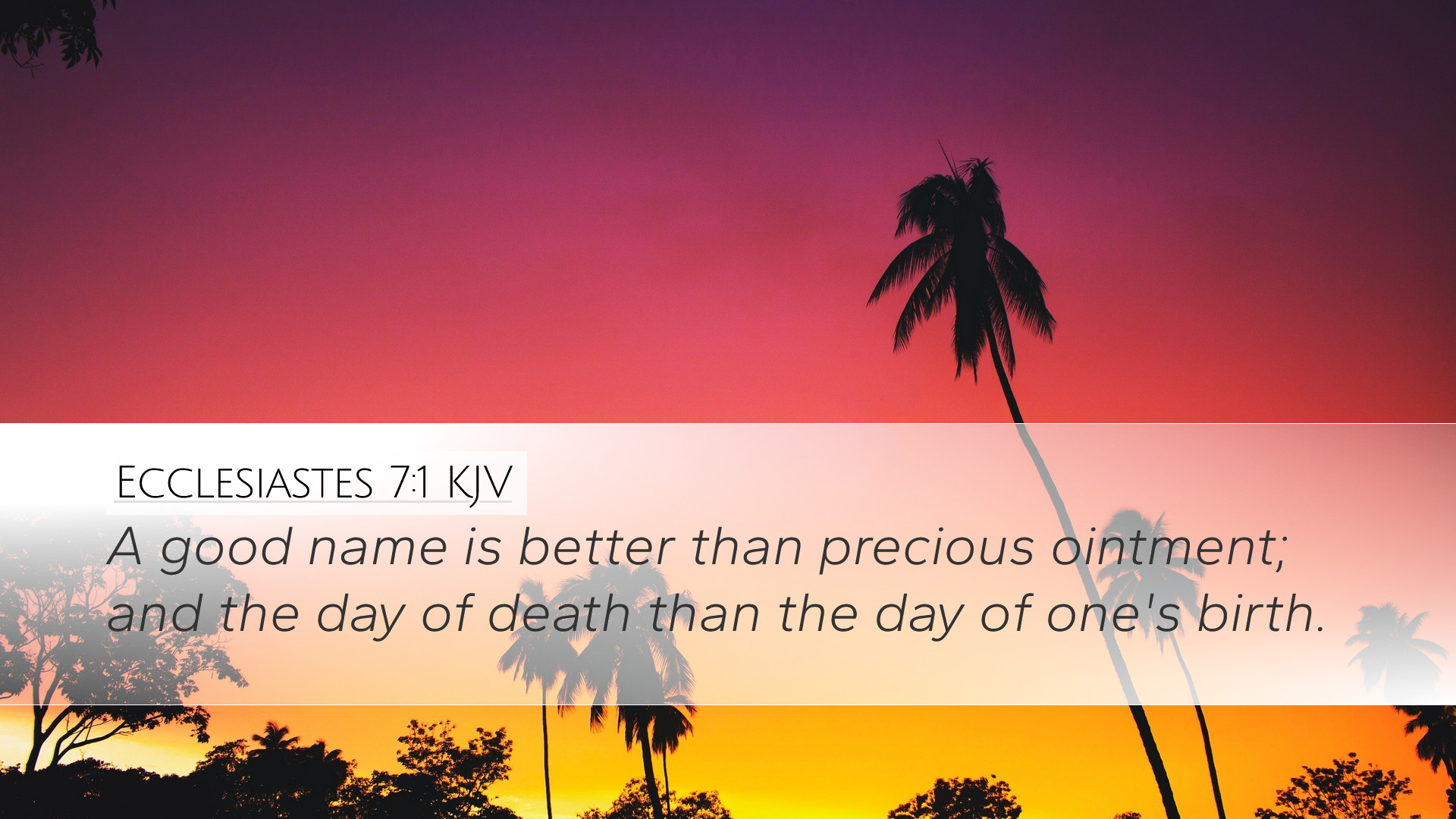Commentary on Ecclesiastes 7:1
Verse: "A good name is better than precious ointment; and the day of death than the day of one's birth."
Introduction
Ecclesiastes 7:1 presents profound truths that challenge worldly values and elevate spiritual understanding. In this verse, the preacher highlights the importance of one’s reputation over material wealth and contrasts the significance of death with that of birth.
Insights from Matthew Henry
Matthew Henry emphasizes that a "good name" signifies a reputation that reflects integrity, virtue, and moral character. He asserts that such a name is priceless, transcending material wealth symbolized by "precious ointment." In the cultural context of the time, ointment was not only valuable for personal grooming but also used in anointing and ceremonial practices.
Henry explains that the pursuit of a good reputation should be prioritized. He argues that this highlights the ethical dimension of living; that a person’s worth is not found in their possessions but in their moral standing within the community. In examining the contrast of death and birth, Henry suggests that the day of one's death serves as a culmination of one’s life experiences and achievements. It is seen as a time of reflection on the life lived, underscoring the importance of how one is remembered.
Analysis by Albert Barnes
Albert Barnes further explicates the concept of a "good name". He notes that it is comparable to a rare treasure that is hard to obtain yet easily lost. His commentary points out that a solid reputation facilitates trust and community respect, making it greatly preferable to physical wealth, which can lead to pride and moral decay. He cautions against the pursuit of wealth as the ultimate goal, suggesting that it often leads to dissatisfaction and folly.
Barnes elaborates on the latter part of the verse, positing that the remembrance of a good name after death contributes to a legacy that withstands the passage of time. He also discusses the Old Testament context where names and legacies were critically important. Death is portrayed not just as an end but as a transition, offering believers an opportunity to reflect deeply on the significance of their earthly lives.
Insights from Adam Clarke
Adam Clarke approaches the verse with a philosophical lens, noting that a good name acts as a protective shield against life's adversities. He asserts that a well-established reputation can influence a person's experiences and interactions, shaping one's understanding of the world. Clarke connects the significance of a good name to the moral responsibilities that accompany it, urging a commitment to virtuous living.
In discussing the day of one’s death, Clarke emphasizes its inherent value in prompting contemplation about life choices. He argues that while birth signifies potential, it is in death that one’s life purpose and actions are ultimately evaluated. Thus, he invites the reader to ponder on how they wish to be remembered and what legacy they aim to leave behind.
Theological Implications
The theological ramifications of Ecclesiastes 7:1 underscore a greater universal truth about the human experience. It calls the faithful to recognize the value of a life lived under godly principles, where one's name is a testimony of God’s grace and guidance. This perspective reshapes the understanding of success and fulfillment in life.
- Value of Reputation: A reminder that believers should strive to uphold a reputation that honors God, demonstrating integrity and love in all dealings.
- The Role of Death: Encourages the faithful to see death not merely as an end but as a transformative moment that can lead to eternity with God, serving as a culmination of life’s meaning.
- Living Intentionally: Highlights the importance of living with purpose to ensure a legacy that reflects one's faith and values.
Practical Applications
For pastors, students, and theologians, the reflection on Ecclesiastes 7:1 must translate into actionable insights that influence daily living. Here are several applications for consideration:
- Evaluate Life Choices: Regularly assess decisions to ensure alignment with biblical values, aiming for a good name over worldly success.
- Focus on Legacy: Consider how actions today will impact future generations and one’s lasting influence in the community.
- Pursue Community Integrity: Foster a culture of integrity within congregations or educational settings, prioritizing character development alongside academic and pastoral achievements.
Conclusion
Ecclesiastes 7:1 serves as a vital reminder for those immersed in scriptural studies and pastoral care to value a good name and the significance of life’s end. They are called not only to reflect on their own lives but to guide others in making choices that honor God and foster meaningful legacies.


